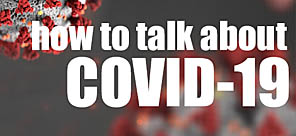


Combating Uncertainty: How to Talk about COVID-19
By Howard Fencl, Hennes Communications
The only thing certain about COVID-19 is uncertainty. That’s the primary challenge facing communicators as coronavirus clusters bloom and fatalities mount world-wide.
But as Christopher Moore and John Kaag write in The Uncertainty Principle, “Humans crave certainty. We long to know what will happen, what to believe, and how to live. To think and learn about the world, we must be willing to be uncertain: to accept that we don’t yet know everything.”
That’s a tall order to fill in our partisan-fueled, social media-obsessed culture. In the desperate search for certainty and solace amid COVID-19, many people are dismissing the outbreak as a political tool – a coronavirus conspiracy. Misinformation spreads like an infection across social media because of confirmation bias – the tendency of people to seek and listen only to those viewpoints supporting their own, the facts be damned. It’s a quick way to claim a piece of certainty when certainty is as elusive as a COVID-19 vaccine.
Adding to the unease is the uncertainty of epidemiologists and infectious disease experts themselves. They are feverishly working to understand more about the behavior and spread of the virus to halt its unrelenting march across the globe. Scientists are racing against the clock to develop a vaccine.
What is left in the meantime is a vacuum of uncertainty. At the Life Care Center of Kirkland, Washington, where 20 nursing home residents have died of COVID-19 as of March 11, family members expressed frustration over a lack of information from the facility.
“I can no longer sit around and wait for a phone call to tell me my loved one has died,” said Kevin Connolly at a press conference held by relatives of Life Care Center residents. Connolly’s 81-year-old father-in-law lives in the facility.
“Our loved ones that live here are already amongst the most vulnerable in the community, and they are being left to be picked off one by one by this disease,” Connolly said. “We’ve been complaining for days about the lack of information we have received.”
We are urging our clients to tell employees and the people important to them what is known about COVID-19, how to prevent infection, what to do if they become ill, and steps the company is taking to keep the virus from spreading. To mitigate uncertainty among your audiences:
- Regularly and frequently communicate coronavirus information and company policy via email, intranet, etc. Look for every opportunity to communicate. Most people aren’t expecting great revelations. They are expecting you to stay in touch.
- Aggregate communications on a dedicated company COVID-19 website, updated as necessary
- Provide information links to authoritative websites for your local board of health, the Centers for Disease Control (CDC) and the World Health Organization (WHO)
- Discourage reliance on social media or non-medical sources for virus information
- Reinforce health experts’ recommendations for hand hygiene and other personal preventive measures. Make hand sanitizer, antibacterial soap and tissues easily available throughout your facility
- Reinforce health experts’ recommendations for steps to take when symptoms arise
- Protect the identity of employees diagnosed with COVID-19
A recent comment by the WHO’s director general speaks volumes: “The bottom line is: we are not at the mercy of this virus…the rule of the game is: Never give up.”
What is certain about COVID-19 is that you and your employees can act to combat its spread. That’s why it’s important to communicate proactively and regularly so the people we care most about can take appropriate steps to fight the virus and better focus on their work, their family and their lives, rather than fixate on the unknown.